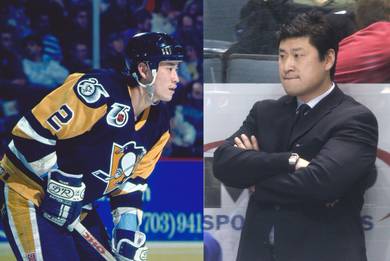- California Assembly OKs highest minimum wage in nation
- S. Korea unveils first graphic cigarette warnings
- US joins with South Korea, Japan in bid to deter North Korea
- LPGA golfer Chun In-gee finally back in action
- S. Korea won’t be top seed in final World Cup qualification round
- US men’s soccer misses 2nd straight Olympics
- US back on track in qualifying with 4-0 win over Guatemala
- High-intensity workout injuries spawn cottage industry
- CDC expands range of Zika mosquitoes into parts of Northeast
- Who knew? ‘The Walking Dead’ is helping families connect
You can go home again
Korean ice hockey, in danger of becoming the first host nation to miss its own Winter Olympics, hired Jim Paek, who won two Stanley Cups with the Pittsburgh Penguins, as its head coach.
By Lee Kyutae
South Korean ice hockey finally got desperate enough to hire probably the most qualified Korean-born hockey coach for its national team.
It took Korea to be in danger of becoming the first host country to fail to send its ice hockey team to the Winter Olympics.
The Korea Ice Hockey Association (KIHA) announced Jim Paek (백지선), who won two Stanley Cup with the Pittsburgh Penguins, as the new head coach of the men’s national team on Wednesday. He agreed to a four-year deal but financial terms weren’t disclosed.
Paek, 47, was the first Korean-born player to play in the National Hockey League (NHL). He was drafted by the Penguins in the ninth round, 170th overall, in the 1985 NHL Draft.
Paek will also take on Program Director duties for the Korean national team.
“The idea of coaching the National Team in the Olympics is one of my dreams. I’ve always wanted to help develop Korean hockey. I’ve returned to Korea many times to run hockey schools and coached Korean teams travelling to Canada. What a great opportunity I have now,” he said in an interview with the International Ice Hockey Federation (IIHF).
Paek was born in Seoul but moved to Canada at age one. Paek won back-to-back Stanley Cups with the Penguins, playing alongside superstars such as Mario Lemieux, Jaromir Jagr and Paul Coffey, in 1991 and 1992. Paek remains the only South Korean-born player to have his name engraved into hockey’s Holy Grail.
After his playing career ended, Paek turned to coaching, and has been an assistant coach for the Grand Rapids Griffins of the American Hockey League (AHL), a minor league affiliate of the NHL’s Detroit Red Wings, since 2005. The Griffins won the AHL title in 2013.
But Paek has a tough job ahead of him. Given that the top nine countries in the IIHF world ranking automatically get spots in the 12-team Olympic competition, the bottom line suggested by the IIHF is to raise its world ranking to at least 18th to be given special consideration.
















